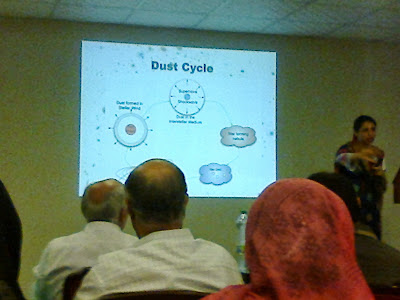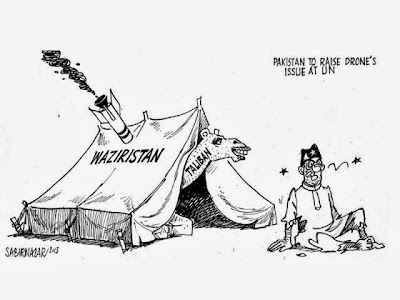[When I wrote this piece, I titled it as,
Saddam Hussein: A King of our Times, but
The News carried it with a better
title:
The kings among us]
Once upon a time, there was a king. He was
born in a city called Tikrit. He was brought up in a fatherless family with
poor means of livelihood. He rose from a street fighter to be a Powerful King of
Iraq.
It
may be objected that the story of Saddam Hussein cannot be narrated in such a
manner. Because the times are different! We are living in a modern or as is
said in a post-modern age. But going through the details of Saddam Hussein’s
life and career as a ruler makes one convinced that his tale may easily be
narrated like the tales of Kings are described in story, history or
semi-historical books.
Here
is an attempt at that:
Saddam
Hussein was born in Tikrit, Iraq. He was a fatherless child. His family was
poor. With time, he rose to glory. As a result of a coup in 1968, he seized
power under the banner of Pan-Arab Baath Party. In 1979, he became President.
In 1980, he invaded Iran
and fought an 8 years long war. In 1990, he attacked and got hold of Kuwait. This
act of Saddam Hussein proved to be a crucial turn in his career, and was the
beginning of his end.
After
an abortive US war in 1991, during the second
US war in April 2003, his rule of
absolute power spanning three decades started crumbling. Finally, he was
captured from an underground cell in December 2003. The Dujail trial began in
October 2005, and his second trial on the charges of war crimes and genocide of
Iraqi Kurds commenced in August 2006. The second trial never concluded and he
was sentenced to be hanged in November 2006 on the charges of ordering the
death of 148 Shiites, and was hanged on December 30, 2006.
After
his downfall, there were still his supporters and there were blasts, killings,
etc. allegedly committed by his supporters. There were many other crimes
committed by him and his henchmen, and their trials were waiting to be heard in
the Iraqi courts of law. But nothing could save him.
It
is told he lived a life of wealth and luxury Kings used to live. To give an
example: his bathrooms were fitted with gold taps, and sure there would be many
more stories of his life of abundance. And, certainly, like most Kings, after
his downfall, he came to live, from a life of luxury to, a humble life when he
spent 3 years in a military cell under US custody.
This
is the story of King Saddam Hussein.
Now
after his death, there are fears that he is going to live as a martyr-cum-hero.
And, there are people who have come to develop sympathy for him, if not for his
cause (if any!). This has created great confusion and needs to be dealt with
rationally and consistently: the two most important adjectives relevant to the
post-Saddam’s Execution situation.
What
makes things unclear, first and foremost, is our language. Secondly, there is
the category of time as was mentioned in the start.
Our
language has us believe that a King is essentially different from a President
or a Prime Minister. And, lo we believe that. Since Saddam Hussein was
designated as a President, he was not a King. Since in pre-modern times, there
were no Presidents or Prime Ministers, hence there were only Kings. Thus, both
language and time come to the rescue of not only Saddam Hussein but all the
other Saddam Husseins and their likes, who in our times are designated
variously but they are surely Kings.
Hence,
what we should bother about is what is that makes a King a King, and a
President a President. Sure, in pre-modern times there were Kings who cannot be
termed Pure Kings; and there are in our times Presidents (Ah, where are they?!)
who are difficult to be designated as Pure Presidents. But we are concerned
only with Pure Kings and Pure Presidents. Not the mixed breed. Knowing about
the unmixed breed will immensely help us to separate chaff from wheat
rationally and consistently out of the present lot including Saddam Hussein,
and thus we will be able to have a ‘who is who.’
The
essential thing that makes a King a King is his own self as the source of law.
As is told of many kings, or tyrants or despots, they were law unto themselves.
Whatever they wished, said, or did, came to be known and written as law. This
was the rule of one man, a monarch. In case of a monarch sharing his power with
a clique of his associates, it was the rule of a few, an oligarchy. But substantially
it was not different from Kingship since the source of law was those few who
ruled.
Contrary
to this, a President, or Prime Minister or in whatever way he is designated, is
not a source of law. He is not law unto himself. Rather, and importantly, he is
bound by law. Whatever he wishes, says, or does, is not law in any manner. This
clearly implies that his words and actions are strictly in accordance with the
law of the land. He cannot step over his powers assigned to him by law.
Whatever the system of government, he is to act under and according to the law.
He is never free like a King, and sure he is never powerful like a King. Only
his duties and powers assigned by law differentiate him from ordinary citizens;
and, at the same time, in the eyes of law he is not above and privileged from
other citizens.
However,
there are cases and examples that defy these criteria. Why Nausherwan or
Anusherwan of pre-Islamic Iran
is known as Anusherwan the Just? Wasn’t he like a President? Apart from the delicacies
of differences amongst historians regarding the quality of rule of Anusherwan,
we can safely assume that his fame of a just ruler depends upon this: he must
have followed certain rules and laws consistently which amounted to justice in
those times. That quality of Anusherwan doesn’t absolve him from the verdict of
a rule of law. Obviously, he himself was a source of law, just or unjust. Thus,
a benevolent dictator can never replace a ruler bound by law. Since, one of the
greatest achievements of human civilization is a government where law rules.
Here no ruler rules.
What
about the recent case of Saddam Hussein? Wasn’t he a President? Wasn’t he bound
by Iraqi constitution and law? Wasn’t he not a source of law? Wasn’t his word
or action not law? Wasn’t he belonged to post-modern times? Doesn’t all this
make him not a King?
Differences
aside, he ruled Iraqi people like a King. He manipulated Iraqi law and
constitution to suit his desires and interests. He usurped the rule of law and
turned it into a rule of/by him and his associates. Whereas, even the act of
softening law to make room for one’s self-rule negates the very essence of rule
of law. Many a President and Prime Minister (or whatever their designations
are) of our times are essentially Kings, if not totally, to a greater extent
certainly. But that’s just a euphemism. In principle, any bungling with the
rule of law, willful or otherwise, must be taken as an attack on the rule of
law, and never be tolerated; because if it is tolerated, it will give birth
ultimately to a Saddam Hussein.
Once
again consider the case of those who have got sympathy with Saddam Hussein on
his ‘tragic’ death. Of the many reasons for their sympathy cited by them the
most important are: i) that he was not given a fair trial; ii) that he was
hanged on the day of Eid-ul-Azha. In this case, the role of the internal
politics of Iraq
and regional/international politics cannot be under-estimated. And, sure if there
were mistakes or say unlawful actions, they must be condemned and dealt with
accordingly. But it is not clear what allows us to sympathize with one who in
the capacity of a President acted as a King. Or, how could we be kind to one
who in any constitutional capacity acts like a King.
This
is the problem of consistency. Since we believe that a government is run by
individuals, be they Presidents or Kings; we can’t differentiate between good
and bad governments. For us, there are only good rulers or bad rulers; or there
are only just rulers or unjust rulers like Anusherwan or other cruel tyrants.
That is why we think, believe, speak, and act in an unprincipled manner,
utterly inconsistently. It is this logic that permits us to side with good or
bad rulers whether they are alive or dead.
The
other problem that doesn’t let us think, believe, speak, and act consistently
is the problem of rationality. We believe irrationally that certain persons are
born to be Kings or Presidents. We believe irrationally that certain persons
are above law. We irrationally believe that certain persons are privileged in
the eyes of law. We believe irrationally that certain persons are capable of
delivering everything such as food, clothing, shelter, etc. to others. We
believe irrationally that certain laws are not for rulers; they are for those
who are ruled. We believe irrationally that certain persons are there to rule
others.
Whereas
rationality requires us to believe that everyone is born with certain
inalienable rights including the rights to life, liberty, property and the
pursuit of happiness. That everyone is free to be whatever he wishes to be.
That everyone is equal before law. That everyone is capable of living his life
on his own and as he wishes. That rules and laws are equally applicable to
everyone be he a ruler or be he one of the ruled. That all the persons are born
to rule themselves only and not others.
Thus,
acting in a rational and consistent manner means to have and show regard for
the inalienable rights and freedoms of others. Whoever violates these freedoms
of others loses his right to these freedoms. The rule of law is the only means
to protect these inalienable rights and freedoms of every person without any
discrimination. It is rule of law that is the greatest supporter of ordinary
people, have-nots and misers. Hence, one who plays with it, one who defies it,
one who makes a travesty of it, never deserves any sympathy be he Saddam
Hussein or someone else!
[This
article was completed on January 10, 2007.]














